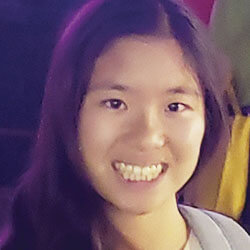
It’s Thanksgiving evening. I’m in the kitchen with my A-ma (grandma), standing over a pot of simmering Taiwanese braised pork belly while also preparing a batch of creamy mashed potatoes, my two identities melding together. The scent of five-spice and star anise floats through the air.
She samples a spoonful of the pork broth, exclaiming, “Wow, Serena, you’re a really good cook. You’re a great jiě jie (big sister) to your brother and will make an excellent homemaker someday.”
“Aiyah,” I think to myself, “here we go again.” I reply loudly with, “Thank you, A-ma, but I still want to be a breadwinner and maybe study business when I grow up.” She replies, “Aiyah, Serena, quiet down, you’re too loud for a girl. Don’t be so opinionated, it’s not ladylike.”
“It’s not ladylike.” The last three words tug on the ends of my nerves. This is the fourth time today that she’s mentioned this. Down the hall, my brother stubs his toe on a door, hurling a few choice words through the air.
No response from A-ma.
She holds me to a double standard: as the oldest child and what she thinks is the ideal young Asian woman, and it frustrates me daily. She expects me to be responsible and care for the home when my parents are busy, to do well in school, to get good grades, to be exceptional, and yet, to be “quiet and ladylike”. As a second-generation Taiwanese American, my beliefs have developed to be quite different from hers. While I agree with her cooking advice, I hold a different perspective about gender roles, and this results in many exasperating conversations on an almost daily basis.
My grandmother is very headstrong and set in her beliefs. While I respect that, it has led to increased tensions in our constant disagreement. I have come to realize that sometimes, the most restorative thing to do is to forgive a person by accepting that they will not change their habits and setting some boundaries when necessary.
Forgiveness is messy and vulnerable. People are complex, each with their own beliefs and convictions. Familial differences are uniquely challenging, since you interact with that person on a relatively more frequent basis. Thus, striving to find a “resolution” and getting the other person to change can be tremendously difficult and risks straining the relationship even more. I’ve found that in these instances, it is best to make room in your heart to accept this difference and seek a middle ground.
As a perfectionistic individual, this discovery has also made me realize the value of forgiving yourself for “not doing enough” by acknowledging what you have done and setting healthy boundaries.
Sometimes, forgiveness is mistaken as a “weakling’s” passive path out of discomfort, a simple “I’m sorry” murmured hastily as one looks at their feet and walks out the door of responsibility. Yet, the reality is: Restorative forgiveness is something profoundly powerful and exceptionally empowering if carried through. Ultimately, restorative forgiveness frees the forgiver from past resentment, anger, and bitterness. Forgiveness does not erase the past hurt, but rather, it prevents the issue from further tarnishing the future through grudges and stifled, unresolved emotion. It allows you to let go of the past, be present, and move forward. Forgiveness isn’t just about mending the relationships or letting the other person “off the hook”. It is also a gift to yourself.
I wrote the following poem as both an encouragement and a splash of reality to all of those who, like me, may often feel that we are “unqualified” to forgive or ask for forgiveness, because it might just be “stirring up trouble”. Restorative forgiveness is opening a conversation about the past, stepping out boldly in vulnerable, uncomfortable faith. Sometimes, like the Serenity Prayer, it also means asking our heavenly Creator to grant us the peace, patience, and trust to accept what cannot be changed, and the courage to set healthy boundaries to heal.
Even
Amidst the reluctance
Realize that Forgiveness,
A second chance, Sets you free
The Transgressor
Freed from the past,
The Transgressed
Still remembering trespasses,
But confining the damage to the past.
Instead of a tarnished future,
Finding Hope
Called to Re-Create
A new path to dialogue
Middle Ground
Healing.
It may be uncomfortable
Difficult
Painful
Costly
Healing takes time
A reshaping of the heart
And the mind
Forgiveness
A complex puzzle
Many spectrums
Of struggle
From traffic trivialities
And careless comments
To historical wrongdoings
Families broken
Generations mistreated
Voices silenced
Races divided
Death.
Grief.
Irreversible Loss.
Words spoken
Hatefully
Hastily
Angrily
Time-worn
Grudges
Broken ties
Painful silence
Forgiveness isn’t easy.
God’s children
We must ask:
Help!
I cannot do this on my own,
But I open my heart
To embrace Your open arms
Providing me new strength
To step Out
Faithfully.
Vulnerably.
Fully.

Serena Lin, a high school junior, is a Southern California native who loves solving problems and finding yummy dairy-free food. Known for her quirky encouragements and tiny origami cranes, she runs a business and blog that specializes in crafting memorable inspiration. www.simplycranes.com